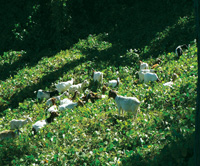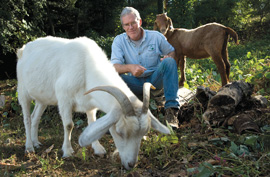Molly Moore | August 1, 2011 | 3 Comments

Goats have been used to graze as small a plot as 12 by 60 foot backyards and as large as 20,000 acres. Photo courtesy of Brian Knox.
If you are looking for a new twist on farm life, here is one: using goats to clear brush, mow lawns and remove invasive species.
Brian Knox, founder of Eco-Goats, one of the East Coast’s leading goat clearing companies, became interested in goats when he bumped into a friend who had gotten to know his 50 goats so well that he no longer wanted to use them for meat.
“Goats have a lot of personality,” said Knox. “You either love them or they drive you crazy. But we started looking at the various uses of goats out west and decided to try out the goats clearing a few stewardship properties around here.”
Goats are the perfect lawn mowers for overgrown spaces, roadsides, open fields and woodland areas that need to be cleared. And here’s the real kicker—they have stomachs that can digest poison ivy, and they love eating it. Goats also love invasive species such as kudzu, multi-flora rose, Japanese honeysuckle and Oriental bittersweet.
“When the press got a hold of what we were doing, things got crazy,” said Knox.

Brian Knox
Crazy good, he means. The business has become wildly successful and taken over his summers. Knox is one of three commercial grazers that he knows of on the East Coast using goats to clear areas. His herd is stationed in Maryland, but in the summer he travels as far as Virginia, West Virginia, Pennsylvania and New York. Although Knox loves his seasonal job, traveling with goats from location to location is tough.
“You may spend five hours cutting a path and putting a fence up on a third of an acre,” said Knox. “It’s hot, dirty work through poison ivy, brush and thorns. If you don’t enjoy the work, its not worth the effort.”
Using these sweet, but hard-working animals is becoming a popular way to clear areas. They are agile and light on their feet, which means they are gentle on the land. Knox’s customer base really likes that aspect of goat mowing.
Another benefit is that by using goats to manage weeds and other unwanted vegetation, landowners can avoid toxic chemicals from large machinery. Companies like Google and Yahoo and city and state governments are hiring goat owners to clear and maintain their properties as a way to avoid air and sound pollution from heavy machinery.
With interest in goat landscaping services increasing, more goat owners are looking into profiting from this unique business model.
“It definitely is a way to make money,” said Knox. “If you already have goats and are looking for a way to cut feed costs, you can hire goats out to others and fatten them up by moving goats around on other people’s property to eat up invasive species.”
Full of personality, sweet, cost-effective and hard-working—goats sounds like a good deal for anyone looking to clear some brush, or better yet—diversify their own farming processes. Got your goat?
For more info on eco-goats, visit: eco-goats.com.
Like this content? Subscribe to The Voice email digests
We offer the same service here in the Blue Ridge Mountains of North Carolina. We are located about 15 miles outside of Boone, NC. Take a look at our website and let us know if you would like more information on using goats to clear unwanted vegetation!
We have a lot in cullowhee, NC , not far from Cashiers. We would like it cleared. Do you travel to that are Area?
Cell 908-285-0998
We have about a half acre in Cashiers, NC we would like cleared of brambles, multiflora rose, bittersweet, and English Ivy. Do you come to this area?